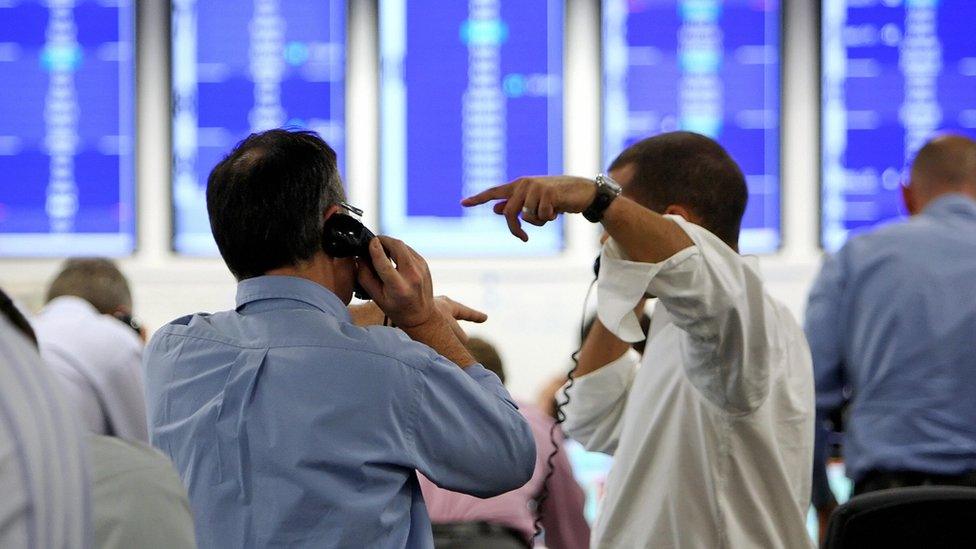Why is the FTSE breaking records?
- Published

Records tumbled as waves of euphoria crashed over the markets once again.
For the ninth time in a row, the FTSE 100 ended at a record close on Tuesday - the first time that has ever happened since the index was compiled in 1984.
The pat answer for soaring share prices has been the falling pound.
The FTSE 100 is stuffed full of miners, oil companies and banks who earn most of their money in dollars.
As the pound falls (which it has in the last couple of weeks, on the perceived increased likelihood of a "hard" Brexit), so those foreign earnings are worth more in sterling terms. Ergo, share prices rise.
But hang on, the pound has been lower than this since June and yet share prices are much higher.
Something else is going on and that something is Donald J Trump.
His promise to spend $1 trillion on infrastructure, cut taxes and bring home trillions more in profits marooned in offshore tax havens, has unleashed animal spirits in stock investors in the US. That has been made all the more infectious to UK markets by the huge aforementioned rise in dollar-based earnings for UK listed companies.
"Great rotation"
There is another factor also at play here. If you believe inflation is coming down the track, and there are good reasons to think it is, then bonds are a bad thing to own. Their fixed returns are worth comparatively less as prices rise. Far better to be in shares, whose value rises along with the price of the stuff that companies sell.
Some believe that what we are also witnessing the beginning of "the great rotation". This is the ominous name market-watchers have given to the moment at which, after 30 years of buying bonds, investors realise they are getting next to nothing in return for these safe haven assets and dump them in favour of shares.
I should make it clear that opinion on whether we are at this crossroads is bitterly divided. Goldman Sachs' chief equity strategist, David Kostin, has likened news of the great rotation because of "Trumpflation" to the fake news scandals that dogged the campaign itself. Others have pointed to big redemptions from bond funds in the two months since the election.
Either or neither may be true - we may be experiencing a rotation, just not that "great". There won't necessarily be a stampede out of bonds, as there will always be an appetite for safe investments such as bonds. (At least you know you are very likely to get back what you put in).
Shares rising
All of this is great news for company bosses, who get paid most of their bonuses in shares and are required to hang on them for a few years. The shares they are about to get and those from previous years are soaring in value. But what does it mean for the rest of us?

Some think Trump's election promises have unleashed "animal spirits" in stock investors
The good news is that those people with pension plans which invest in shares will see the value of those pots rise. This is particularly important for people with schemes where you put in a fixed amount - a defined contribution - but are not guaranteed what you get at the end. The bigger the pot gets, the more you get out at the end.
Cost of living
It's also good news for the trustees of guaranteed final salary-based schemes, as many are in deficit and this market rally could help make up some of that shortfall.
The bad news is that if inflation does move to between 3 and 4%, as many expect, it will make us all (apart from company bosses, of course) feel that little bit poorer. As we are a country that imports more than it exports, there is no way round the big fall in the value of sterling since the referendum.
Even in the white heat of supermarket competition, the cost of an average basket rose for the first time in three years in the 12 weeks up to 1 January, according to industry-watchers Kantar, and that momentum is expected to continue as suppliers pass on increased production costs to retailers and ultimately consumers.
While retirement pots may swell, so will the cost of living in the here and now.